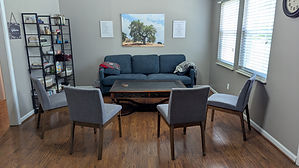Frequently Asked Questions
Do you work in-person or using telehealth?
I’ve moved to working primarily in-person, as I find it the most effective way to connect and engage. That said, I do offer telehealth occasionally in certain situations, but my preference is to work in person whenever possible.
Where do you meet?
113 Rolling Acres Drive in Rockwood. Yes it's a house. You know you've found it if you see the big flowers on the wall outside the front door. It is by appointment only.
Does a Marriage and Family Therapist work with individuals?
Absolutely. While my training as a Marriage and Family Therapist includes a focus on relationships and family systems, many of my clients are individuals. I support people navigating a wide range of personal challenges, not just those related to relationships.
What ages do you work with?
I work with teens and adults. During our free consultation call, we can work together to make sure this will be a good fit.
What do you charge and how long is a session?
As of 2025, individual, couples, and family sessions are $100 each and typically last around one hour.
Group therapy sessions (6 max participants) are $40 per person. It will be one hour when there are only 1-2 participants. When there are 3-6, we'll go for 90 minutes.
Do you offer a free initial consultation?
Yes, I am willing to do an initial consultation for free to answer questions and see if it is a good fit. These meetings are typically shorter and done by phone.
Do you take insurance?
No, I do not accept insurance directly. However, I can provide a superbill—a detailed receipt that you can submit to your insurance provider for possible out-of-network reimbursement. I recommend contacting your insurance company directly to ask how they handle superbills, as reimbursement policies vary. Since I am not affiliated with insurance providers, I’m unable to answer specific questions about their processes or coverage.
What are issues you don't work with?
I typically do not work with eating disorders, autism spectrum disorders, schizophrenia, or substance use disorders as primary treatment concerns. These areas often require specialized support, and I believe clients are best served within a comprehensive system of care. I may work with individuals facing these challenges if they are already connected to a broader treatment team—such as psychiatrists, nutritionists, or recovery specialists—as part of a coordinated approach.
Do I have to be a Christian to be a client?
No. While I personally hold Christian beliefs, my approach in session is respectful, welcoming, and client-centered. I do not impose my faith or values. If a client expresses a desire to incorporate their own faith or spirituality into the therapeutic process, I am open to integrating that in a way that supports their goals—but it is never expected or required.
Please Note (Religion and Politics)
Your therapist's religion and politics should not impact your therapy experience negatively. Ethically a therapist should not impose their views on you and should create a safe environment for you to discuss whatever you need to process.
What Does the Office Look Like?


